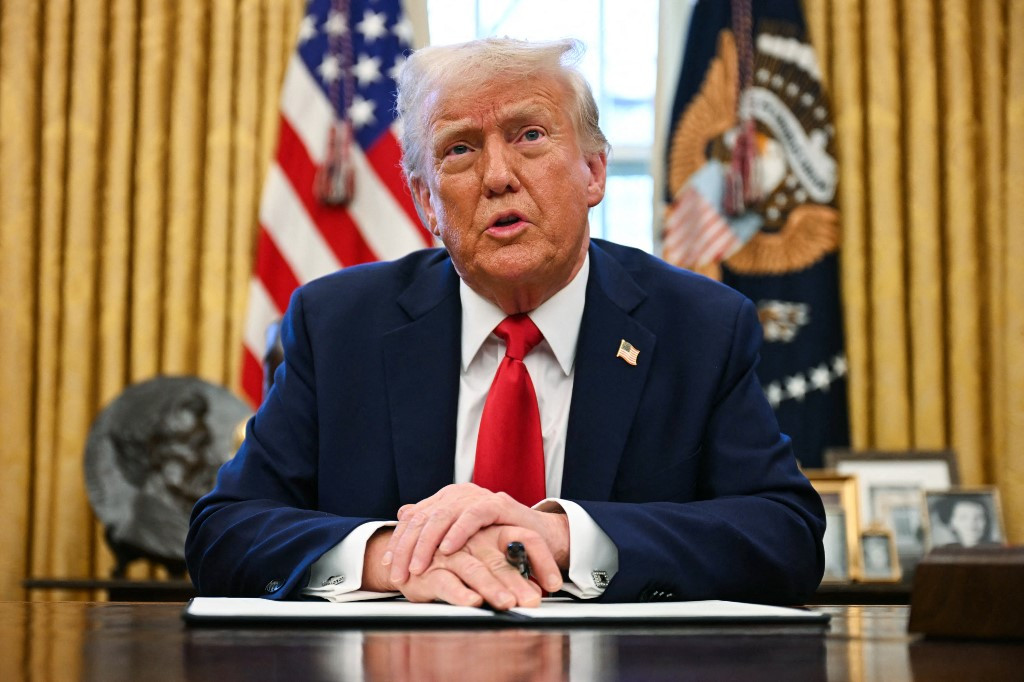Popular Reads
Top Results
Can't find what you're looking for?
View all search resultsPopular Reads
Top Results
Can't find what you're looking for?
View all search resultsHow to counter Trump's tariffs productively?
Rather than imposing reciprocal tariffs, countries would do better to consider other measures, both individually and collectively, to mitigate the domestic and global economic fallout from Trump's trade war, including strengthening regional trade blocs.
Change text size
Gift Premium Articles
to Anyone
A
fter months of threats and speculation, United States President Donald Trump has officially launched his long-anticipated trade war: He has just imposed 25 percent tariffs on all steel and aluminum imports.
His new 10 percent tariff on Chinese imports will further strain the world’s second-largest economy, which is already grappling with slowing growth and unfavorable demographics.
And his postponed, but not canceled, 25 percent tariffs on Canada and Mexico, together with threats to impose new tariffs on the European Union, India and many more countries, put greater pressure on key US allies.
While many countries are considering retaliatory tariffs on US goods, such measures are both unproductive and unlikely to deter Trump.
One reason is that most countries run trade surpluses with the United States and therefore have fewer US goods to target than the US does. More importantly, higher tariffs on US imports will hurt their own citizens and firms. Consequently, their ability to counter Trump’s tariffs is severely limited.
A more productive approach would be to focus on minimizing the economic fallout.
To do so, it is important to recognize that both a trade and a financial channel could cause Trump’s trade war to trigger a global economic downturn.
Beyond his tariffs on metals and China, Trump previously pledged to impose a 10 percent tariff on all imported goods. More recently, he proposed targeting only countries with which the US has a trade deficit, as well as a “Fair and Reciprocal Plan” that would tailor tariff rates to US trading partners’ own barriers. While that may sound like a more measured approach, the US currently runs bilateral deficits with most countries, including 12 of its top 15 trading partners.
Although Trump’s tariffs will inflict economic pain on US households and businesses, that is unlikely to discourage him, partly because he views tariffs as a way to offset, at least partly, the revenue losses from his planned tax cuts. The fact that his tariffs will ultimately be paid by American consumers, especially middle- and low-income households, does not appear to concern him.
Although Trump’s tariffs probably will not reduce the US trade deficit, they will have far-reaching implications for interest rates worldwide. If the Federal Reserve takes no action, the tariffs will drive up the prices of both imported goods and domestically produced goods that compete with them or rely on imported inputs.
But the Fed is unlikely to sit idly by, especially with US inflation already above its 2 percent target. Instead, it will likely delay its planned interest rate cuts or even raise rates to offset the inflationary impact of Trump’s tariffs. Financial markets already anticipate such a response: The dollar has been appreciating with each new tariff threat.
Higher US interest rates will likely trigger a global liquidity squeeze, putting corporations and governments with high dollar-denominated debts at risk of default. If other central banks follow the Fed’s lead on interest rates, as they often do, even firms and households without significant dollar debts could face financial difficulties.
Governments can take several steps to mitigate the Trump trade shock.
First, they must devise effective retaliation strategies. The EU’s Anti-Coercion Instrument provides a useful model for applying economic pressure without directly harming domestic industries.
For example, these measures could allow the bloc to suspend intellectual property protections for US software and streaming services or restrict US banks and financial service providers from operating within EU markets.
Developing countries might find such measures especially attractive, because the US tends to run large trade surpluses in intellectual property and financial services.
China’s mineral export restrictions offer another example. Since China effectively controls the global supply of several critical raw materials, these measures could hurt US corporate profits while simultaneously raising those of domestic firms. China has refrained from doing this in the last decade after losing a World Trade Organization (WTO) case on restricting rare earth exports.
Since the US tariffs also violate its obligations under the WTO, China may feel less constrained this time. A number of other countries have market power in some key products they export, and might explore a similar approach.
Governments must also consider the indirect yet significant impact of interest rate and exchange rate fluctuations from Trump’s tariffs. For emerging markets and developing economies, this means keeping short-term foreign debt at sustainable levels.
Globally, companies must prepare for the possibility that interest rates will remain elevated for longer than anticipated.
Beyond individual responses, countries must pursue collective action. Strengthening regional economic integration by removing trade and investment barriers within existing trade blocs would be much more productive than raising tariffs on US goods.
Expediting negotiations on new trade and investment agreements, including interregional partnerships like the incipient one between the EU and the South American bloc Mercosur, could also serve as an effective countermeasure.
The Trump administration’s trade war is like a Category 5 hurricane: while inherently destructive, its impact can be mitigated. By avoiding panic and fostering strategic partnerships, the world economy can better weather the storm.
---
The writer is a former chief economist at the Asian Development Bank and a professor of finance and economics at the Columbia Business School and the Columbia School of International and Public Affairs (SIPA).











